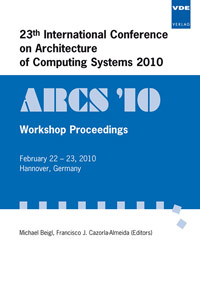A First Experimental Investigation of the Practical Efficiency of Battery Scheduling
Konferenz: ARCS 2010 - 23th International Conference on Architecture of Computing Systems
22.02.2010 - 23.02.2010 in Hannover, Germany
Tagungsband: ARCS 2010
Seiten: 6Sprache: EnglischTyp: PDF
Persönliche VDE-Mitglieder erhalten auf diesen Artikel 10% Rabatt
Autoren:
Miliche, Damien; Graaf, Maurits de; Hoekstra, Gerard (Thales, Innovation Research & Technology, Huizen, The Netherlands)
Jongerden, Marijn; Haverkort, Boudewijn (CTIT, University of Twente, Enschede, The Netherlands)
Haverkort, Boudewijn (Embedded Systems Institute, Eindhoven, The Netherlands)
Inhalt:
Nowadays, mobile devices are used more and more, and their battery lifetime is a key concern. In this paper, we concentrate on a method called battery scheduling with the aim to optimize the battery lifetime of mobile devices. This technique has already been largely theoretically studied in other papers. It consists, for systems containing multiple batteries, in switching the load from one battery to the other. Then, while following a given scheduling sequence, advantage can be taken from the recovery and rate capacity effects. However, little studies with experimental data of battery scheduling have been found. In this paper we describe a simple setup for measuring the possible gain of battery scheduling, and give some exploratory results for two types of real batteries: a smart Li-Ion battery used in the Thales personal communication system and a more commonly used NiCd battery. The results, so far, show that system lifetime extension is not systematic, and generally can only reach less then 10%.


